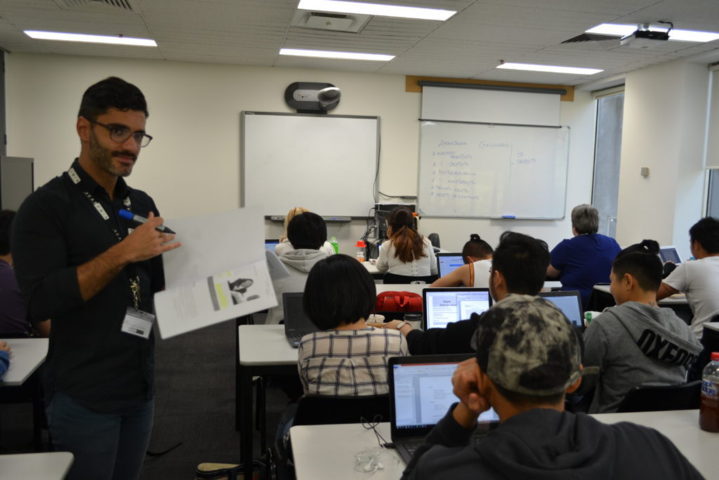Learn what managers do before starting a management course in Melbourne

We often see them seated in their office, busy on a phone call, signing something or poring over important-looking papers.
Some days, you never see them come out of the conference room or leaving their office, busy talking to a client or meeting with other senior members of the team.
Most of us work with a manager. Many of us even aspire to be in their position, with our own office and nameplate on the door.
But what exactly does a manager do day-in, day out?
It’s a good question – one that we’ll be answering today.
And while we’re here, we’ll also go over how Academia’s management courses in Melbourne can prepare you for the role!
Management roles and responsibilities
We’ve talked before about the POLC framework, and its constituent parts. In case you missed that article, here’s a quick recap:
Planning
The setting of immediate and long-term goals, as well as how success is to be measured
Organising
Logistics, and ensuring that physical and human resources are allocated to achieve your plans
Leading
Inspiring and motivating staff to work at their best (this is different from managing)
Controlling
Measuring performance, and ensuring that your team is performing at its best
Day-to-day, these high-level responsibilities often takes the form of…
Checking on work and project status
One of the main duties of a manager?
Ensuring that their team is performing well, and that they have all the resources needed to get the job done.
To do this, managers need to keep close tabs on work and project statuses.
There are many ways to provide this supervision which will depend on the organisation you work at:
- Direct supervision
- Weekly reports
- A team leader, who keeps you informed of daily updates
As a manager, you’ll need to look at what sorts of goals you’ve attached to the project, as well as the number of people working underneath you and how many other things you need to be aware of.
For example, say you’re managing a small team. In this case, you’re probably elbow-deep in the project yourself, during day-to-day operation, making direct supervision the most suitable form of supervision.
Now let’s say that this project is just one of many that you need to keep up with.
In this case, you may be better served by delegating most of the direct supervision to a team lead (an important skill itself), and checking in periodically, say, weekly, and checking out monthly reports.
Our management courses in Melbourne cover a wide range of ways in which progress can be tracked, as well as which one is most suitable for each given situation.
This will help you keep up with your team’s work, and be a better manager.
Monitoring staff performance
In some businesses, monitoring staff performance can take the form of key metrics and KPIs.
For example, a call centre manager might focus on call times, or caller satisfaction scores.
But what if success is harder to measure in your particular field?
For example, say you work in hospitality management. In this case, staff performance is much harder to gauge, and may require direct observation and feedback from diners and guests.
One important skill of managers is learning what matters, and not losing sight of the forest for the trees.
In particular, many managers focus on metrics instead of the other, harder to define aspects of staff performance.
Another thing that many managers forget is that monitoring staff performance should be done with the purpose of helping staff members to improve.
Once their area of weakness are identified, you can get to work on fixing them together, as well as finding ways to capitalise on their strengths to build the strongest, most effective team.
Finally, it also helps you identify star performers and reward them accordingly with bonuses and other benefits!
Managing resources
One of the biggest responsibilities of any manager is logistics. Specifically, it’s about ensuring that your team has the resources to get the job done, while also minimising waste, and maximising efficiency.
Two of the most important parts of this? Budgeting and expense management.
Cost and budget management are two of the essential skills that managers should possess, and overlaps with bookkeeping and other financial skills.
Academia’s management courses in Melbourne don’t just teach you the theory – they also include essential budgeting and financial subjects. In addition to making you more financially-literate, these subjects can also make you a better manager!
With these skills under your belt, you’ll be able to better manage the resources your team has been assigned, succeeding in your assigned task or project.
Keeps the team united
As a manager, your role contains considerable overlap with leadership.
Specifically, as a manager you’ll be responsible for ensuring that your team is working together productively and functions as a united front.
In particular, you’ll be in charge of:
- Mediating disputes
- Solving impending issues
- Maintaining team synergy
- Delegating and assigning roles
Some people are inherently better-equipped to handle these sorts of interpersonal problems than others.
Luckily for the rest of us, many of these skills and techniques can be taught!
In addition to the “hard skills”, Academia’s management courses in Melbourne also coaches students on essential “soft skills” that a good manager needs, such as conflict-resolution and negotiation skills.
All of this is essential in maintaining team unity, and therefore, helping your team complete its projects!
Learn more about the difference between management and leadership.
Enroll in Academia’s management courses in Melbourne!
Take your career to the next level with Academia.
Whether your goal is to advance in your current organisation or turn yourself into a more attractive job applicant, Academia’s range of leadership and management courses in Melbourne build you up into an effective leader in any organisation.
Our management courses:
- Certificate IV in Business
- Diploma in Business
- Diploma of Marketing and Communications
- Advanced Diploma of Leadership and Management
Interested in studying with us? Learn more about our business and management courses by contacting our friendly course advisors today!
Alternatively, fill in this form to reach out online, and we will get in touch soon!






